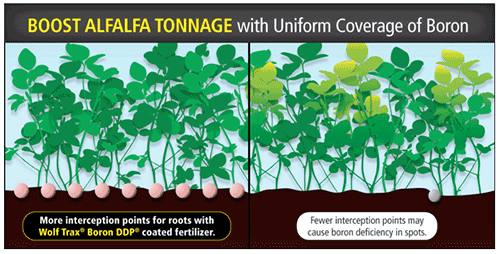
Alfalfa growers shooting for high-production, high-yielding hay know that fertilizing boosts quality and tonnage. You have a lot of options when you're choosing what kind of fertilizer to use to optimize forage production, but one important nutrient requirement that shouldn't be overlooked is boron.
Boron is important to the establishment and re-growth of alfalfa. Because boron is essential for proper cell wall formation, highly cellulosic crops like alfalfa have high boron requirements. Alfalfa fields require frequent boron fertilizer applications because you're constantly removing the whole crop from the field; unlike crops like corn, where boron stored up in the cellulosic part of the plant - the corn stover - recycles back into the soil as the stover breaks down after harvest.
When you're choosing what kind of fertilizer to use, ensure your alfalfa has the nutrient requirements it needs after a cutting. Boost yields with a cost-effective application of Wolf Trax® Boron DDP®, a proven performer in intensely managed alfalfa systems.
Dairy farmers in and around Dorchester, Wis., have been applying Boron DDP as a coating on their dry fertilizer for the past four years. Matt Potocnik, location manager and sales agronomist with Heartland Cooperative Services of Dorchester, switched the majority of his customers from granular boron fertilizer to Boron DDP from Wolf Trax because of the uniform coverage possible with Boron DDP. For progressive farmers, that better distribution gives more certainty that every alfalfa plant has access to the boron it needs for optimum re-growth and pollination.

Specially formulated, Boron DDP can be applied in several ways that are convenient for alfalfa growers:
1. Coat Boron DDP onto dry fertilizer applied prior to or after a cutting.
2. Mix Boron DDP with an insecticide or fungicide spray in-season.
3. Apply Boron DDP in a foliar application or through fertigation.
Matt shares that in the Dorchester area, 90 percent or more of the Boron DDP he is selling is applied after the first cutting, which is usually the largest crop. With the boron application, the farmers are working to replenish the nutrients that have been harvested from the field to enable better production for the remainder of the summer.
Also because adequate levels of boron can improve winter hardiness, this application helps ensure nutrient reserves going into fall.
Matt adds that more progressive growers are utilizing in-season fungicide and insecticide applications to manage pests. Boron DDP has a good fit in those in-season applications as well.
If you want to boost your alfalfa yields this season, ask for a better boron fertilizer option for alfalfa. Ask your fertilizer dealer for Boron DDP.
Author
Kevin Boehm
As a territory manager for Compass Minerals Plant Nutrition, Kevin provides technical support including alfalfa fertilizer recommendations to retailers and farmers across the northern Midwest.
5.22.2015